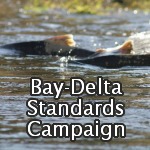For years, water contractors have been attempting to deflect attention from the massive fish carnage at the state and federal export pumping facilities by blaming striped bass and predators for the demise of salmon and Delta smelt fisheries. In 2008, the Coalition for a Sustainable Delta, a misnamed group funded by water contractors, filed suit against the Department of Fish and Wildlife seeking restrictions on striped bass. That lawsuit fizzled in 2010. They then sought to have the Fish and Game Commission relax regulations protecting stripers in 2011 but the Commission unanimously rejected it. CSPA intervened in the lawsuit and testified at the Commission hearing. The contractors then persuaded the Department, NOAA fisheries and the U.S. Fish and Wildlife Service to conduct a workshop before an expert panel to assess the impact of predation on salmon populations.
The workshop was conducted in Davis on July 2013 before a panel of six selected experts from around the nation. CSPA Board Member John Beuttler and fishery consultant Tom Cannon testified at the workshop and subsequently submitted written comments.
A final report was released on 25 September 2013. The panel acknowledged that fish eat fish but observed that the available data and analyses “do not provide unambiguous and comprehensive estimates of fish predation rates on juvenile salmon or steelhead nor on population level effects for the species in the Delta.” They went on to observe that, “given extensive flow modification, altered habitat conditions, native and non-native fish and avian predators, temperature and dissolved oxygen limitations, and overall reduction in historical salmon population size, it is not clear what proportion of juvenile mortality can be directly attributed to fish predation.” They pointed out that “stress caused by harsh environmental conditions or toxicant will render fish more susceptible to all sources of mortality including predation, disease or physiological stress.” They concluded by recommending a “variety of structural changes to the manner in which research is performed in the Delta.”
Hopefully, the report will put to rest the efforts of water contractors to blame the fish. Most documented predation occurs at state and federal project facilities. The massive export pumping facilities in the South Delta are based on 1950’s technology and have killed over a billion fish in the last decade. Water contractors have adamantly refused to pay for new state-of-the-art fish screens.









